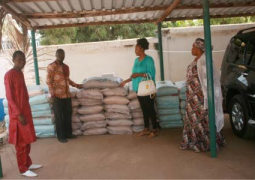
Bah was one of only 22 individuals out of 198 nominations submitted by leading U.S. academic and research institutions to receive four years of funding to invest in exploratory research.
Bah’s research studies how proteins that lack a fixed structure form membraneless cellular subcompartments support biological processes.
Upstate Vice President for Research David Amberg, PhD, praised Bah for being Upstate's first Pew Scholar. "We are all so very pleased to see Dr. Bah recognized in this way. He is the first Pew Scholar named at Upstate, it is very prestigious award and is typically given to young research faculty at the top biomedical research universities in the country.
"This is a great honor for Dr. Bah and an honor for Upstate as well. Dr. Bah’s work is structural and biophysical in nature but during his time at Upstate, he has confirmed himself to be a very productive, creative and collaborative colleague who thinks deeply about the translation of his research accomplishments," Amberg said.
The Pew Scholars Program in the Biomedical Sciences provides funding to young investigators of outstanding promise in science relevant to the advancement of human health. The program makes grants to selected academic institutions to support the independent research of outstanding individuals who are early-career junior faculty.
“Pew has a history of supporting talented researchers who are committed to understanding intricate scientific processes,” said Susan K. Urahn, Pew’s president and CEO. “Our newest cohort of scholars is joining a large community of accomplished scientists who are dedicated to uncovering new solutions to significant biomedical challenges.”
The 2021 class of scholars—all of whom are early-career junior faculty—join more than 1,000 other scientists who have received awards from Pew since 1985. Current scholars have opportunities to meet annually, share ongoing research, and exchange perspectives across the health sciences field.
“Biomedical research is one of the best pathways we have to understand and overcome the world’s greatest health hurdles,” said Craig C. Mello, Ph.D., a 1995 Pew scholar, 2006 Nobel laureate in physiology or medicine, and chair of the national advisory committee for the scholars program. “I am confident that these researchers will uphold the Pew scholar legacy of advancing scientific discovery.”





